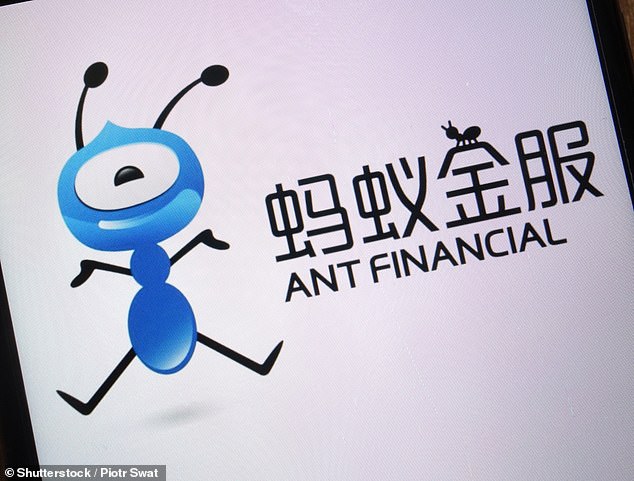Chinese payments business poised to raise more than £26bn in world’s biggest stock market float
A Chinese payments business is poised to raise more than £26billion in the world’s biggest stock market float.
Ant Group’s dual listing in Hong Kong and Shanghai will see it valued at about $10.30 (£7.90) per share next month, or £214billion, some £100billion more than Britain’s most valuable firm, Unilever, which is worth £121.85billion.
The company owns the Alipay mobile payments service, which was set up by Chinese entrepreneur Jack Ma and boasts more than 1.2billion users.
Flexing its muscles: Ant Group’s dual listing in Hong Kong and Shanghai will see it valued at £214billion
Its listing will be the biggest in history, with the cash raised set to exceed the £23billion pulled in by state oil giant Saudi Aramco in a float last year.
Shares in Ant Group are expected to begin trading days after the US presidential election, on November 3, with the float receiving strong demand from small investors. Ma, who also set up Alibaba, said it marked the first time the price of such a big deal had been determined outside America. He added: ‘We didn’t dare think about it five years ago, or even three years ago. But a miracle just occurred.’
Hangzhou-based Ant Group was launched in 2004 as a payments provider for ecommerce titan Alibaba, before it was spun off in 2011.
Alibaba will still own a 32 per cent stake in the business after its float. Its Alipay app acts as a Swiss army knife of financial services, with a ‘digital wallet’ that lets users make debit card and credit card payments with their smartphones.
Alipay’s main rival in China is Wechat, which also boasts more than a billion accounts.
By comparison, US giant Paypal says it has about 350m active users.
Ma has suggested Alipay could eventually supplant traditional banks, which he compared to ‘pawn shops’ because they typically require customers to have sufficient collateral before making loans. He said China’s relatively young financial system should be driven by technologies such as big data, cloud computing and blockchain, instead of following traditional methods of banking that involve large amounts of red-tape.
However, Ant has also faced growing regulatory scrutiny of its lucrative consumer credit business, while the US State Department is also reportedly seeking to blacklist it.
Announcing its deal terms yesterday, Ant said large investors in the Shanghai tranche of the float would include Singapore state investor Temasek Holdings, as well as Singaporean and Abu Dhabi sovereign wealth funds GIC and Abu Dhabi Investment Authority.
It has earmarked 80 per cent of its domestic offering to 29 big investors that will be locked up for at least one year and will also include China’s National Council for Social Security Fund.
Ant shares are expected to start trading in Hong Kong and Shanghai on November 5.

